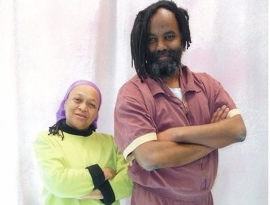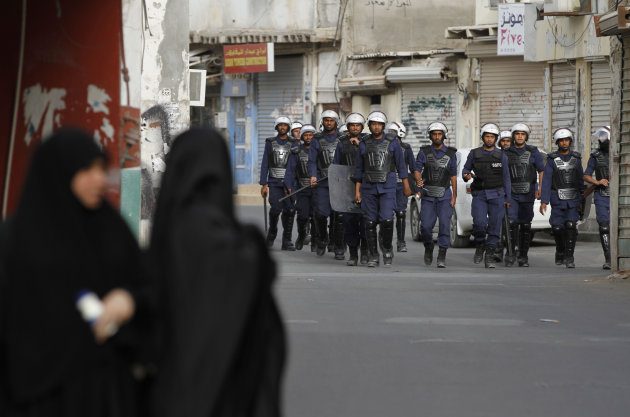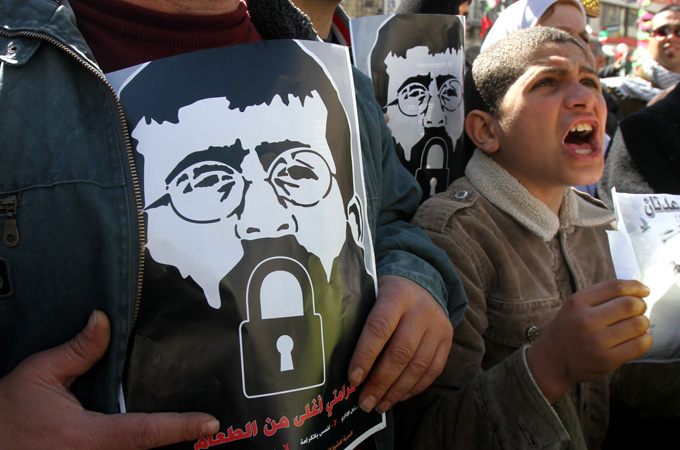April 21, 2012 By ANDREW F. MARCH New York Times
LATE last year, a jury in Boston convicted Tarek Mehanna, a 29-year-old
pharmacist born in Pittsburgh, of material support for terrorism,
conspiring to provide material support to terrorists and conspiring to
kill in a foreign country, after a 35-day trial in which I testified as
an expert witness for the defense.
WHDH-TV, via Associated Press
A video image of Tarek Mehanna outside federal court in Boston in 2009.
On April 12, Mr. Mehanna was sentenced to 17 and a half years in prison.
Hearing this, most Americans would probably assume that the F.B.I.
caught a major homegrown terrorist and that 17 and a half years is
reasonable punishment for someone plotting to engage in terrorism. The
details, however, reveal this to be one of the most important free
speech cases we have seen since Brandenburg v. Ohio in 1969.
As a political scientist specializing in Islamic law and war, I
frequently read, store, share and translate texts and videos by jihadi
groups. As a political philosopher, I debate the ethics of killing. As a
citizen, I express views, thoughts and emotions about killing to other
citizens. As a human being, I sometimes feel joy (I am ashamed to admit)
at the suffering of some humans and anger at the suffering of others.
At Mr. Mehanna’s trial, I saw how those same actions can constitute federal crimes.
Because Mr. Mehanna’s conviction was based largely on things he said,
wrote and translated. Yet that speech was not prosecuted according to
the Brandenburg standard of incitement to “imminent lawless action” but
according to the much more troubling standard of having the intent to
support a foreign terrorist organization.
Mr. Mehanna was convicted and sentenced based on two broad sets of
facts. First, in 2004, Mr. Mehanna traveled with a friend to Yemen for a
week, in search, the government said, of a jihadi training camp from
which they would then proceed to Iraq to fight American nationals. The
trip was a complete bust, and Mr. Mehanna returned home.
Some of his friends continued to look for ways to join foreign
conflicts. One even fought in Somalia. But Mr. Mehanna stayed home,
completed a doctorate in pharmacology and practiced and taught in the
Boston area. But the Yemen trip and the actions of his friends were only
one part of the government’s case.
For the government, Mr. Mehanna’s delivery of “material support”
consisted not in his failed effort to join jihadi groups he never found,
nor in financial contributions he never made to friends trying to join
such groups, but in advocating the jihadi cause from his home in
Sudbury.
MR. MEHANNA’S crimes were speech crimes, even thought crimes. The kinds
of speech that the government successfully criminalized were not about
coordinating acts of terror or giving directions on how to carry out
violent acts. The speech for which Mr. Mehanna was convicted involved
the religious and political advocacy of certain causes beyond American
shores.
The government’s indictment of Mr. Mehanna lists the following acts,
among others, as furthering a criminal conspiracy: “watched jihadi
videos,” “discussed efforts to create like-minded youth,” “discussed”
the “religious justification” for certain violent acts like suicide
bombings, “created and/or translated, accepted credit for authoring and
distributed text, videos and other media to inspire others to engage in
violent jihad,” “sought out online Internet links to tribute videos,”
and spoke of “admiration and love for Usama bin Laden.” It is important
to appreciate that those acts were not used by the government to
demonstrate the intent or mental state behind some other crime in the
way racist speech is used to prove that a violent act was a hate crime.
They were the crime, because the conspiracy was to support Al Qaeda by advocating for it through speech.
Much of Mr. Mehanna’s speech on Web sites and in IM chats was brutal,
disgusting and unambiguously supportive of Islamic insurgencies in Iraq,
Afghanistan and Somalia. In one harrowing IM chat, which the government
brought up repeatedly during the trial, he referred to the mutilation
of the remains of American soldiers in response to the rape of a
14-year-old Iraqi girl as “Texas BBQ.” He wrote poetry in praise of
martyrdom. But is the government right that such speech, however
repulsive, can be criminalized as material support for terrorism?
In the 2010 Supreme Court decision Holder v. Humanitarian Law Project,
Chief Justice John G. Roberts Jr. declared that for speech to qualify as
criminal material support, it has to take the form of expert advice or
assistance conveyed in coordination with or under the control of a
designated foreign terrorist organization. In that decision, Justice
Roberts reaffirmed that “under the material-support statute, plaintiffs
may say anything they wish on any topic” and pointed out that “Congress
has not sought to suppress ideas or opinions in the form of ‘pure
political speech.’ ” Justice Roberts emphasized that he wanted to “in no
way suggest that a regulation of independent speech would pass
constitutional muster, even if the Government were to show that such
speech benefits foreign terrorist organizations.”
The government’s case against Mr. Mehanna, however, did not rest on
proving that his translations were done in coordination with Al Qaeda.
Citing no explicit coordination with or direction by a foreign terrorist
organization, the government’s case rested primarily on Mr. Mehanna’s
intent in saying the things he said — his political and religious
thoughts, feelings and viewpoints.
The prosecution’s strategy, a far cry from Justice Roberts’s statement
that “independent advocacy” of a terror group’s ideology, aims or
methods is not a crime, produced many ominous ideas. For example, in his
opening statement to the jury one prosecutor suggested that “it’s not
illegal to watch something on the television. It is illegal, however, to
watch something in order to cultivate your desire, your ideology.” In
other words, viewing perfectly legal material can become a crime with
nothing other than a change of heart. When it comes to prosecuting
speech as support for terrorism, it’s the thought that counts.
That is all troubling enough, but it gets worse. Not only has the
government prosecuted a citizen for “independent advocacy” of a terror
group, but it has prosecuted a citizen who actively argued against much
of what most Americans mean when they talk about terrorism.
On a Web site that the government made central to the conspiracy charge,
Mr. Mehanna angrily contested the common jihadi argument that American
civilians are legitimate targets because they democratically endorse
their government’s wars and pay taxes that support these wars.
Mr. Mehanna viewed Muslim attacks on foreign occupying militaries as
justified but rejected the Qaeda doctrine that the civilian citizens of a
foreign country at war with Muslims can be targeted. His doctrine was
that “those who fight Muslims may be fought, not those who have the same
nationality as those who fight.”
The centerpiece of the government’s case against Mr. Mehanna’s speech
activities was a translation of a text titled “39 Ways to Serve and
Participate in Jihad.” The government described this text, written by a
late pro-jihad Saudi religious scholar, as a “training manual for
terrorism.” It is nothing of the sort. It is a fairly routine exercise
of Islamic jurisprudence explaining to pious Muslims how they can
discharge what many of them believe to be a duty to contribute to wars
of self-defense.
This text does explain that in Islamic law a Muslim may “go for jihad”
or “collect funds for the mujahidin.” But it also explains that, in
place of fighting or sending money, a Muslim can assuage his conscience
and take care of widows and children, praise fighters, pray for
fighters, become physically fit, learn first aid, learn the Islamic
rules of war, have feelings of enmity for one’s enemies, spread news
about captives and abandon luxury.
The act of translating this text is far from incitement to violent
action. The text in fact shows Muslims numerous ways to help fellow
Muslims suffering in their own lands, without engaging in violence.
Instead of this common-sense reading, however, the government did
something extraordinary. It used this text of Islamic law to help define
for us what should count as a violation of our own material support
law.
Everything Mr. Mehanna did, from hiking to praying, was given a number
in the indictment based on this text as an act of material support for
jihad. For example, his online discussion with a friend about working
out and exercising should, in the government’s words, be “placed next to
the directives in 39 Ways (Step 25: ‘Become Physically Fit’).” Federal
prosecutors, in effect, used a Saudi religious scholar to tell us what
our “material support” statute means.
The Mehanna case presented an excruciating line-drawing exercise. How
pro-Al Qaeda is too pro-Al Qaeda, legally speaking?
We have the resources to prevent acts of violence without threatening
the First Amendment. The Mehanna prosecution is a frightening and
unnecessary attempt to expand the kinds of religious and political
speech that the government can criminalize. The First Circuit Court of
Appeals in Boston should at least invalidate Mr. Mehanna’s conviction
for speech and reaffirm the Supreme Court’s doctrines in Brandenburg and
Holder v. Humanitarian Law Project. Otherwise, the difference between
what I do every day and what Mr. Mehanna did is about the differences
between the thoughts in our heads and the feelings in our hearts, and I
don’t trust prosecutors with that jurisdiction.





















